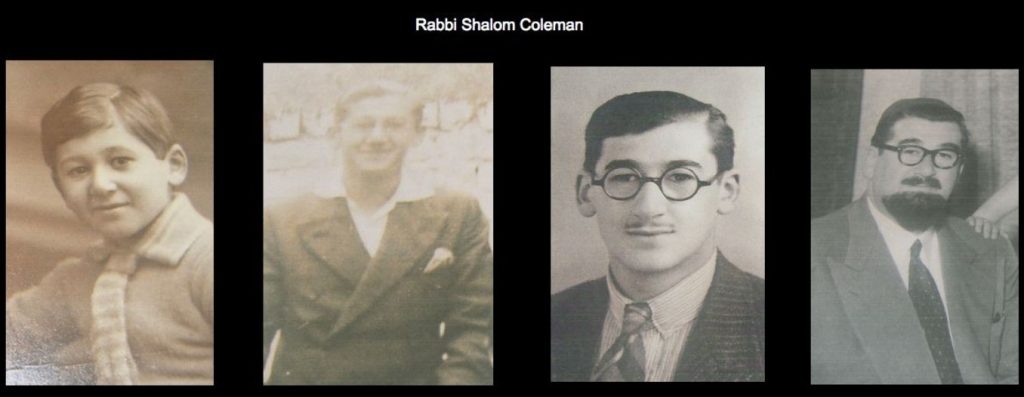Tomorrow marks the Shloshim (30 day mourning period) since Morenu Harav Shalom Coleman ZL passed away.
During the Shiva (7 day mourning period) Rabbi Marcus Solomon (a student of Rabbi Coleman ZL) provided a shiur dedicated to Rabbi Coleman’s memory. A summary of this shuir follows:
Rabbi Solomon Delivers Shuir to honour Rabbi Dr Shalom Coleman Z”L
It was fitting that Shiva minyanim for Rabbi Dr Shalom Coleman were hosted in each of the Shules with which he had direct affiliation. At the Perth Hebrew Congregation where he professionally served for decades, at the Maurice Zeffert Home where he was honorary Rabbi and Life Governor, and at the Dianella Shule Mizrachi Perth where he was a regular Shabbat congregant in his later years.
Senior Rabbi of Dianella Shule, Rabbi Justice Marcus Solomon, was a student of Rabbi Coleman’s academy of Jewish learning from when he arrived in Perth at a young age. Each day there would be pre-school study, culminating in formal exams at the year end. This early Jewish education propelled Marcus Solomon on his journey to advanced Jewish learning in Melbourne, New York and Israel, which was occasioned by visits to each location by Rabbi Coleman to check in on the progress of his student.
Following the Shiva minyan hosted at Dianella Shule at the request of the Coleman family, Rabbi Solomon’s regular Tuesday Beit Midrash shiur was dedicated as a tribute and hesped to the memory of his teacher.
Reflections
Rabbi Solomon reflected on the close association of the Solomon and Coleman families that he fondly recalled in his formative years. He described Rabbi Coleman as a modern and open person who was very steadfast in the tradition that he loved, delivering both commanding Rabbinic leadership blended with unbounded compassion, empathy and respect where it was required.
The shiur was the commencement of the annual cycle of Perekei Avot, the “Ethics of our Fathers” which commences from Pesach each year. Rabbi Solomon commenced by noting that the letters of the word “Mishnah” from which the content is drawn, can be rearranged to spell “Neshama”, alluding to the departed soul of our beloved Rabbi.
The Mishnaic commencement of content through the selection of Perekei Avot from the tractate of Nezikin (an order of legal remedy for damages) can be seemingly considered out of context. However, the beginning of the era of Rabbinic law with the precept of ethics alludes to the need for sensitivity and the application of morals and ethical behaviour as a prerequisite. Rabbi Solomon paused to observe that this reflected the very persona of Rabbi Coleman.
The first chapter of Mishnah records the passage of the chain of tradition, further emphasising that ethical conduct is as much a part of Jewish tradition as the particularities of Jewish law. Interestingly the Mishnah references the passing of the law to 120 individuals. The contemporary significance of this is reflected by the fixed number of 120 seats that sit within the Knesset as the parliament of the modern Jewish state, which remains unadjusted by population growth.
There is little subtlety needed to draw the connection between the Mishnah’s lesson of passing tradition from one generation to the next, and the relationship shared by Rabbi Coleman to Rabbi Solomon.
Rabbi Solomon then pivoted to the last Mishnah of the first chapter of Perekei Avot which reads:
רַבָּן שִׁמְעוֹן בֶּן גַּמְלִיאֵל אוֹמֵר, עַל שְׁלשָׁה דְבָרִים הָעוֹלָם עוֹמֵד, עַל הַדִּין וְעַל הָאֱמֶת וְעַל הַשָּׁלוֹם, שֶׁנֶּאֱמַר (זכריה ח) אֱמֶת וּמִשְׁפַּט שָׁלוֹם שִׁפְטוּ בְּשַׁעֲרֵיכֶם
Rabban Shimon ben Gamaliel used to say: on three things does the world stand: On justice, on truth and on peace, as it is said: “execute the judgment of truth and peace in your gates” (Zechariah 8:16).
Rabbi Solomon observed that the first chapter of Perekei Avot commenced with emphasising the importance of Jewish continuity through the passage of tradition, and ended with foundational and ethical traits. The bookending of these two themes within the Mishna encapsulated the dedication and accomplishments of our dear departed Rabbi.
A concluding reflection was that the Mishna commenced with a focus on inwardly looking Jewish particularism, but ended with universal and outward facing principles. So too, Rabbi Coleman combined these traits across his Rabbinic calling and his many broader civic contributions which endeared him as an ambassador of the Jewish community.
Exemplifying the passage of tradition, juxtaposed with the character defining foundations of justice, truth and peace, become reflective of the standing of Rabbi Coleman and his life’s teachings. His very name was Shalom.

See our original article on the passing of Rabbi Coleman. His time on earth served as a blessing to us all.



